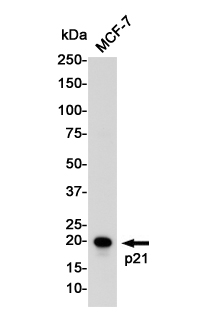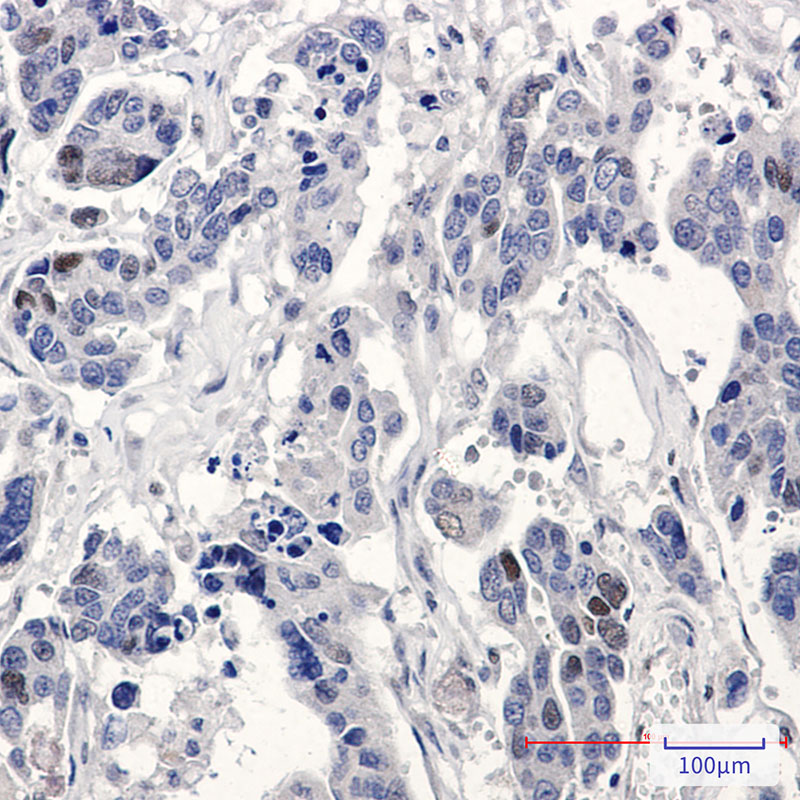

| WB | 咨询技术 | Human,Mouse,Rat |
| IF | 1/20 | Human,Mouse,Rat |
| IHC | 1/50-1/100 | Human,Mouse,Rat |
| ICC | 技术咨询 | Human,Mouse,Rat |
| FCM | 1/50-1/100 | Human,Mouse,Rat |
| Elisa | 咨询技术 | Human,Mouse,Rat |
| Aliases | CDKN1A; CAP20; CDKN1; CIP1; MDA6; PIC1; SDI1; WAF1; Cyclin-dependent kinase inhibitor 1; CDK-interacting protein 1; Melanoma differentiation-associated protein 6; MDA-6; p21 |
| Entrez GeneID | 1026 |
| WB Predicted band size | Calculated MW: 18 kDa; Observed MW: 21 kDa |
| Host/Isotype | Rabbit IgG |
| Antibody Type | Primary antibody |
| Storage | Store at 4°C short term. Aliquot and store at -20°C long term. Avoid freeze/thaw cycles. |
| Species Reactivity | Human |
| Immunogen | A synthetic peptide of human p21 |
| Formulation | Purified antibody in TBS with 0.05% sodium azide,0.05%BSA and 50% glycerol. |
+ +
以下是关于p21抗体的3篇代表性文献信息(基于公开知识库整理,非实时检索结果):
---
1. **文献名称**: "The p21 Cdk-interacting protein Cip1 is a potent inhibitor of G1 cyclin-dependent kinases"
**作者**: Harper, J.W., et al.
**摘要**: 该研究首次详细描述了p21蛋白通过与CDK(细胞周期蛋白依赖性激酶)结合抑制细胞周期进程的功能。文中提到使用特异性p21抗体验证其在细胞周期调控中的作用,并探讨了其在DNA损伤应答中的表达变化。
---
2. **文献名称**: "WAF1. a potential mediator of p53 tumor suppression"
**作者**: El-Deiry, W.S., et al.
**摘要**: 本文克隆了WAF1基因(即p21),证明其受p53调控并在肿瘤抑制中起关键作用。研究利用p21抗体进行蛋白质印迹和免疫沉淀实验,揭示了p21在DNA损伤后通过阻断CDK活性诱导细胞周期停滞的机制。
---
3. **文献名称**: "The roles of p21 in apoptosis and cancer"
**作者**: Gartel, A.L., Tyner, A.L.
**摘要**: 该综述系统总结了p21在细胞凋亡和癌症中的双重作用,包括其促增殖与抗凋亡的矛盾功能。文中强调通过p21抗体的免疫组化分析,发现其在多种肿瘤组织中的差异表达,提示其作为预后标志物的潜力。
---
4. **文献名称**: "p21 is required for senescence and inhibits tumorigenesis in vivo"
**作者**: Brugarolas, J., et al.
**摘要**: 利用转基因小鼠模型,研究发现p21缺失导致细胞衰老障碍并加速肿瘤发生。研究通过p21抗体的免疫荧光染色,证实p21在衰老细胞中的高表达,并验证其对肿瘤抑制的体内功能。
---
**备注**:如需具体文献来源或引用格式,建议通过PubMed、Web of Science等数据库检索最新文献,或参考上述研究的原始论文及综述。
The p21 protein, also known as cyclin-dependent kinase inhibitor 1A (CDKN1A), is a critical regulator of cell cycle progression and a downstream effector of the tumor suppressor p53. It belongs to the CIP/KIP family of cyclin-dependent kinase (CDK) inhibitors, which bind to and inhibit CDK-cyclin complexes, thereby blocking cell cycle transition from G1 to S phase. This activity allows cells to pause proliferation in response to DNA damage, oxidative stress, or other cellular stressors, facilitating repair or triggering apoptosis if damage is irreparable. p21 expression is primarily induced by p53-dependent pathways but can also be regulated by p53-independent mechanisms, including TGF-β and other growth-inhibitory signals.
Antibodies targeting p21 are widely used in biomedical research to detect and quantify p21 protein levels in cells and tissues. These antibodies enable the study of p21's role in cell cycle arrest, senescence, differentiation, and tumor suppression. In cancer research, p21 expression is often assessed to evaluate p53 pathway functionality or therapeutic responses, as its downregulation is associated with tumor progression and chemoresistance. Commercially available p21 antibodies are validated for techniques like Western blotting, immunohistochemistry, and flow cytometry. However, variability in antibody specificity and experimental conditions (e.g., fixation methods) requires careful optimization to ensure reliable results. Overall, p21 antibodies serve as essential tools for exploring cell cycle dynamics and stress responses in health and disease.
×